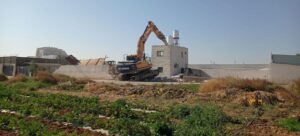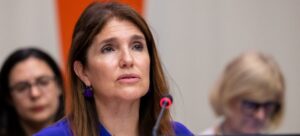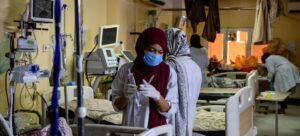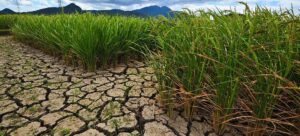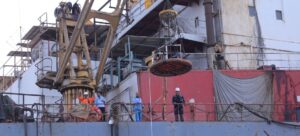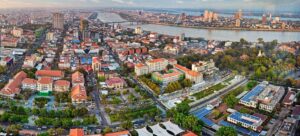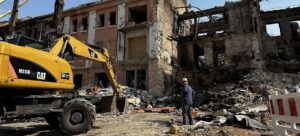The task of transferring a million barrels of oil from the stricken supertanker Yemen, will take some 19 days – preventing what would be the fifth largest spill in history, were the rusting tanker to break apart.
But this process will not end with the oil transfer, because the FSO Safer will continue to pose an environmental threat, the UN is warning. And an additional $22 million in funding is still needed to finish the job.
How did the tanker end up off the Yemen coast?
The Safer was built as a supertanker in 1976, and converted a decade later into what is in effect, a floating oil container.
This ship is anchored around 4.8 nautical miles off the coast of Al Hudaydah Governorate in Yemen and contains an estimated 1.14 million barrels of light crude.
The production, offloading and maintenance operations of the tanker were suspended in 2015 due to the conflict between Houthi rebels and a pro-Government coalition in Yemen, and the structural integrity of the tanker deteriorated significantly, putting it it at risk of collapse.
The systems needed to pump inert gas into the tanker stopped working in 2017, resulting in a real risk of explosion, and the tanker was deemed to be beyond repair.
War-torn Yemen has no capacity or ability to deal with the impact of a massive oil spill, endangering the entire marine ecosystem and economy of the Red Sea – an area that is home to key shipping lanes.
One million barrels of oil is due to be pumped from the FSO Safer off the coast of Yemen.
What are the implications of a massive oil spill?
The cost of emptying the Safer and salvaging it, is estimated at $20 million. But if it were to break apart with the oil onboard, the disaster could cost around $20 billion to clean up.
And if any massive oil spill occurred, it would devastate fishing communities on Yemen’s Red Sea coast, as millions depend on fishing in the area. An oil spill could immediately wipe out 200,000 livelihoods. Entire communities will be exposed to life-threatening toxins, the UN warns.
This major oil spill could shut down the nearby ports of Hudaydah and Saleef; two key outlets for food, fuel and life-saving supplies in a country where 17 million people need food assistance.
The environmental impact on the waters, coral reefs, mangroves and diverse marine life would be severe. The spilled oil could reach the shores of Saudi Arabia, Eritrea, Djibouti and Somalia. Desalination plants on the Red Sea coast could also be shut down, cutting off fresh water sources for millions of people.
Any possible leakage would pollute the air on a large scale. It is also possible that the vital navigation traffic through the Bab al-Mandab Strait to the Suez Canal could be disrupted for a long time, which will cause billions of dollars in losses per day. Tourism would also suffer.
What are the details of the UN-led operation?
Following failed attempts to agree a plan to salvage the Safer in a highly politicized conflict environment, the Resident and Humanitarian Coordinator for Yemen, David Gressly, launched a new initiative, aimed at private sector partners, in mid-2021.
The initiative called for selecting a leading company in the field of marine salvage to remove the oil from the Safer.
A draft plan coordinated by the UN was presented in December 2021.
Since then, the UN has worked closely with the Government of Yemen in Aden, which supported the initiative with a $5 million donation last year.
The Houthi authorities in Sana’a – who control the area in front of which the ship anchors – also signed a memorandum of understanding with the UN on March 5, 2022, setting out a cooperative framework.
The UN Development Programme (UNDP) is implementing the project which began on Wednesday, which includes the following steps:
• A leading global salvage company inspected the Safer, making it safe for the process of transferring the oil.
• Installation of the Calm anchor buoy (CALM) by which the replacement tanker is attached, as well as the scrapping of the Safer tanker
• Preparations began at the end of 2022 as UNDP brought together technical experts from around the world, including a marine management consultancy, a marine law firm, insurance and ship brokers, and oil spill experts.
• In March, the UNDP agreed with EURONAV to purchase a replacement tanker, which was subsequently modified for the operation.
• In April, the UNDP contracted salvage experts SMIT, a subsidiary of Boskalis.
How was the Safer fitted out to complete the oil transfer?
On May 30, the salvage tanker Nadevor arrived at the site to begin the operation.
The Safer crew worked extensively with the rescue team, while the technical committee on the Safer in Hudaydah provided access, security and technical support, and maintained a high level of coordination and cooperation with the UN Operations Team.
The SMIT team did everything they could to maintain the stability of the tanker and prepare the transfer. That process included:
• Comprehensive structural evaluations of the tanker hull, which confirmed that the hull thickness levels are sufficient to withstand the forces generated during the transportation of oil.
• Pumping inert gas into oil shipping tanks to greatly reduce the risk of fire or explosion, and continuous testing to ensure that the atmosphere inside the tank remains at a safe level.
• Preparing portable transfer pumps, preparing hoses and valves, and repairing the Safer reservoir manifold through which oil will flow during the operation.
• Advance preparation of oil spill response equipment.
On July 10, Houthi authorities based in the capital Sana’a granted permission to begin the transfer.
The UNDP, the UN Environment Programme (UNEP) and the International Maritime Organization (IMO), provided high-level expertise to monitor the work and are supporting Yemeni efforts in the event of any accident during the operation.
The World Food Programme (WFP), the UN Population Fund (UNFPA), the UN Department of Safety and Security, and the UN Mission in Support of the Hudaydah Agreement (UNMHA) is also providing expertise and operational support.
The Safer has been at risk of breaking up or exploding for years.
Does the transfer really mean the environmental threat is over?
Even after the transfer, the dilapidated Safer tanker will continue to pose an environmental threat resulting from the sticky oil residue inside the tank, especially since the tanker remains vulnerable to collapse.
To finish the job, $22 million is urgently needed – including a $20 million repayment of internal financing provided by the UN Central Emergency Response Fund (CERF) which has provided sufficient liquidity to begin the operation.
To date, Member States, the private sector and the public have crowdfunded $121 million in contributions and pledges.
The UN is now counting on more generous support to finish this critical task without delay.

